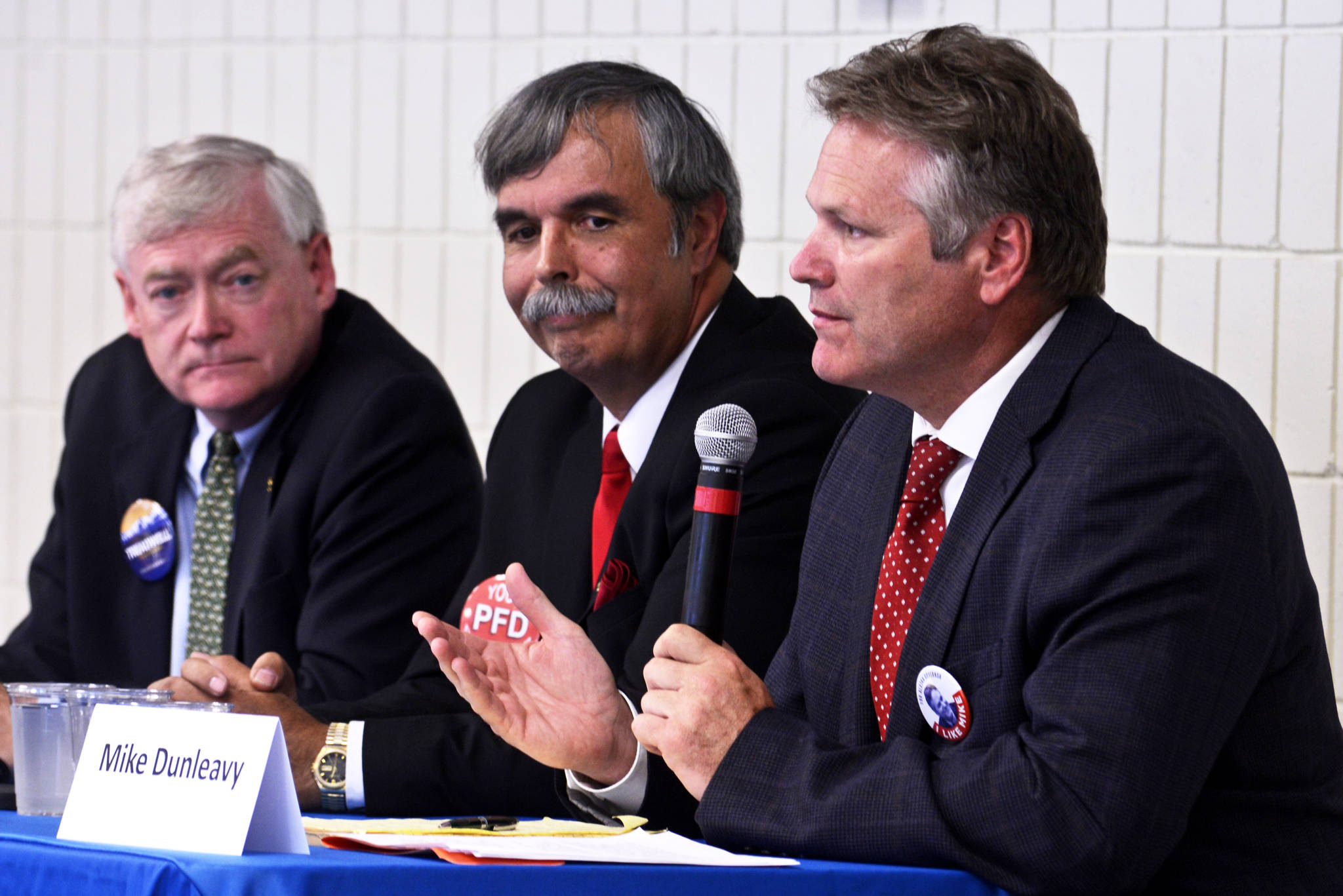Three of this year’s five Republican gubernatorial candidates discussed their plans for state finance, capital spending, and the Alaska LNG project during a Wednesday forum organized by the Soldotna and Kenai Chambers of Commerce.
Candidates Mike Dunleavy of Wasilla, Mead Treadwell of Anchorage, and Michael Sheldon of Petersburg spoke Wednesday at the Soldotna Regional Sports Complex. Republican candidates Darin Colbry of Anchorage and Merica Hlatcu of Anchorage were invited but did not attend. Gerald Heikes of Palmer is also running for the nomination. Voters will choose from these candidates in the Aug. 21 primary elections, determining which will be the Republican candidate for governor in the Nov. 6 general election.
Sheldon, a mechanic and fisherman who in 2016 unsuccessfully challenged Republican Senator Bert Stedman (R-Sitka), has served on the Tribal Board of the Petersburg Indian Association.
Dunleavey, a former state Senator, represented the Matanuska-Susitna Valley before resigning in January 2018 to focus on his gubernatorial campaign.
Treadwell was Alaska’s Lieutenant Governor from 2010 to 2014, when he unsuccessfully ran for the U.S Senate, being defeated in that year’s Republican primary by present U.S Senator Dan Sullivan (R-Alaska).
Capital spending
State finances were a focus of the questions that Chamber members had submitted. Each of the candidates proposed to increase the state’s capital spending, which has dropped sharply since oil prices fell in late 2014. The fiscal 2015 budget — which went into effect July 2014 — contained capital spending of $680.9 million in unrestricted general funds. By the next year that number had fallen to $183.3 million, and the year after to $124.2 million. The present fiscal 2019 budget spends $189.4 million of unrestricted general fund money on capital.
Dunleavy said he’d seek a minimum of $200 million to $300 million in capital spending, Sheldon proposed $935 million, and Treadwell “at least $500 million a year and growing.”
“I’ll grow the capital budget by, one, recycling capital,” Treadwell said. “We have projects the state has paid for that others will now buy from us. The state may have been in it to get it started. The second thing is, I will look for more public-private partnerships. And the third thing is we will grow the capital budget directly as a state and match federal funds and do more.”
Dunleavy said the key to funding capital budgets is cutting the operating budget, which he called “the enemy of the capital budget,” to about $4.1 billion and limiting it to two percent growth.
For the operating budget — which pays for Medicaid, education, law enforcement, and other administrative and regulatory functions — the state’s present budget spends $5.4 billion of unrestricted general funds. Since the oil price drop, this number has fallen from $7.74 billion in fiscal 2015, hitting a low of $5.01 billion in fiscal 2017.
Sheldon, a Tlingit Native, proposed a specific project for capital spending.
“I think what we should do is get refineries on tribal land,” he said. “Being that I’m a Native of Alaska, I should be able to bridge the gap between those two areas, and give incentives to the tribal governments as we use their land, and we get infrastructure in here, refineries. We need refineries so we can service the people first with low fuel, low gas, low stove kerosene and what have you.”
Taxes
The candidates unanimously denounced income tax proposals. Sheldon said a sales tax “would be good, to a certain extent, but how in the world is our state going to be able to figure out how to do an income tax without goofing it all up?”
Treadwell said sales tax is “up to municipalities, and we should not be taking from municipalities’ revenue, that leaves it back on property owners.” He said he wouldn’t favor any form of taxation.
Dunleavy again spoke unfavorably of the operating budget, saying taxes would expand it, and that developing North Slope oil finds would make taxation unnecessary.
LNG
Regarding the project to export North Slope natural gas to Asia via a planned 807-mile pipeline to a liquefaction facility and export terminal in Nikiski, Dunleavy and Treadwell spoke of the need to get the three oil majors BP, Exxon Mobile, and ConocoPhillips back aboard. These companies were once 25 percent partners in the project alongside the state-owned Alaska Gasline Development Corporation (AGDC), which has been the sole project proponent since the private companies pulled out after an unfavorable economic analysis in late 2016.
Treadwell said the project “has to be more economical.” AGDC is funded entirely with legislative appropriations and has been under an austerity program since taking over the project in January 2017 with $106 million remaining from previous appropriations, according to the Alaska Journal of Commerce. AGDC began June 2018 with a fund balance of $53.69 million, according to a financial report to be presented at its upcoming board meeting, and plans to spend the balance down to $7 million by July 2019. In the recent legislative session, lawmakers concerned about losing control over the project denied it the ability to accept funding from other sources.
“For those legislators in the room, I don’t think we have the money to write the next big check,” Treadwell said. “We have to bring the producers back.”
Sheldon, on the other hand, said the LNG project shouldn’t be built. He again advocated building refineries on the North Slope and said any prospective gas pipelines should be dedicated to in-state demand.

